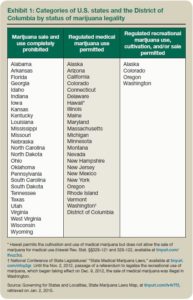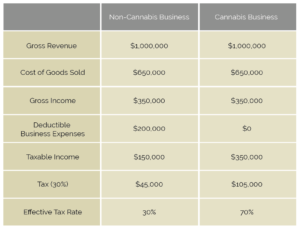 One of the hottest-developing industries in the US, marijuana-related businesses, is still practically shut out of the modern payment system because of an unusual patchwork regulatory situation. The result is that dealing with the cash, banking, and financing parts of this business are stunted and twisted into strange shapes.
One of the hottest-developing industries in the US, marijuana-related businesses, is still practically shut out of the modern payment system because of an unusual patchwork regulatory situation. The result is that dealing with the cash, banking, and financing parts of this business are stunted and twisted into strange shapes.
Schedule 1 Substance
The root of the weird regulations and patchwork solutions is that federal law classifies marijuana as a “Schedule 1” substance, the same as heroin, ecstasy and LSD. Even though marijuana is legal for recreational use in 9 states and for medical use in another 31, regulated financial institutions really, really don’t like the risk of dealing with businesses making money from a Schedule 1 substance. They can’t afford to run afoul of federal laws and regulations. Even in legalized states, sometimes as few as one bank in a whole state, and never more than a handful of banks, offer traditional deposit-taking banking services to marijuana-related businesses.
In addition, major credit card companies like Visa, MasterCard, and American Express consistently refuse to process any payments from any company that touches the product. That means retail customers can’t ever pay with credit or debit cards. Even new fin-tech person-to-person payment services like Venmo, PayPal, and the Cash App regularly shut down services for marijuana-related businesses when they catch a whiff of it. Bank-based lending to the industry essentially does not exist either.
And remember, the industry is not just retail stores, but everything that touches a marijuana plant, from growers to cultivators to processors to cartridge makers to transporters to retailers. It all operates at the fringes of the traditional banking, payments, and finance sector.
Necessity Meets Invention
Morris Denton, CEO of an Austin-area medical cannabis dispensary Compassionate Cultivation, the first licensed dispensary in Texas, confirmed to me that the banking and finance side of running his business remains “a big pain in the butt.” Very few banks are willing to either take the risk or engage in the regulatory headache of working with businesses like his.
Sometimes out of necessity comes invention. For example, a Scottsdale, Arizona-based fin-tech and reg-tech company called Hypur offers a suite of products for the few banks and credit unions willing to serve the industry. As a finance nerd interested in the way traditional banking operates and evolves, the Hypur offering sounds kind of radical and awesome.
As VP of Hypur Tyler Beuerlein describes it, their data and software feed allows a bank to monitor, in real time, every single transaction of their marijuana-based business customers. According to Beuerlein, this super-intrusive data feed is what’s necessary to lower the risk that banks face when dealing with the industry. From a compliance perspective, they empower the marijuana-industry serving banks to know the source and size and timing of every single customer transaction. According to Beuerlein, if a marijuana business made exactly $23,750.22 in sales today, their bank (via Hypur’s data feed) can know that precise amount in real-time.
Cash Problems
To understand both why that’s cool and different, you have to picture some of the tremendous complications that come from a nearly all-cash industry. And also picture the fairly weak information banks typically get from their small business customers.
Cash-based transactions – far less traceable than electronic payments – create a whole series of risk for banks, already super-anxious about federal regulations. How do you prove to the feds the source of a business’ cash is legitimate? How do you comply with anti-terrorism laws? A successful marijuana business typically manages big piles of cash that can’t be easily dealt with.
 Folks in the legal (and quasi-legal) marijuana industry describe strange problems that arise when you run an all-cash business. Like, vaults full of paper money that require powerful fans to keep the money from getting wet and rotting. Over time that cash literally tends to stink like marijuana. One industry veteran described a man who dug a hole for a shipping container in his backyard that he filled with currency. As every bar manager knows, cash has a nasty habit of walking out the door at the end of the night in the pockets of your employees. Big piles of cash also attract thieves who can target your cash at your business location, or when the money is in transport.
Folks in the legal (and quasi-legal) marijuana industry describe strange problems that arise when you run an all-cash business. Like, vaults full of paper money that require powerful fans to keep the money from getting wet and rotting. Over time that cash literally tends to stink like marijuana. One industry veteran described a man who dug a hole for a shipping container in his backyard that he filled with currency. As every bar manager knows, cash has a nasty habit of walking out the door at the end of the night in the pockets of your employees. Big piles of cash also attract thieves who can target your cash at your business location, or when the money is in transport.
Banks in the US generally will not let you initiate large deposits of cash if you cannot account for exactly where it all comes from. Even if the bank agrees to work with you, you can’t simply show up with your previously earned $40,000 in cash and expect the bank to open up your business checking account.
We can all imagine the problems of consumer all-cash transactions, but business-to-business payments are likely even more a hassle, since they’re that much bigger.
When I listen to a description by Beuerlein of Hypur’s data-feed to banks that serve the marijuana-related businesses, it’s interesting to think about how every bank that serves small businesses would in theory want this, even outside the marijuana industry.
Typically banks that make loans to small businesses get very sketchy, partial and intermittent information. If a loan is paid on time, a bank might request a copy of annual tax filings. If a problem arises, maybe the bank demands quarterly or even monthly accounting statements from the business. Those statements are going to be voluntary, prepped by the businesses, and frankly leave a huge amount of discretion to the business owner on what gets reported. It’s interesting – ok, maybe just to finance nerds like me – to think about the banking possibilities of seeing real-time transactions of a borrower. To a banker, that’s like the holy grail of lending.
One of the ironies of heavy business regulation – like what currently weighs on the marijuana business – is that it actually spurs entrepreneurial solution-seeking. When regulation creates enough pain points for businesses, other businesses will step up to try to solve those problems.
Meanwhile, when the Schedule 1 classification gets lifted, this whole regulatory problem changes and mostly goes away. Of course I don’t know if that’s happening 1 year or 10 years from now. (hint: It’s closer to 1 year than 10 years.)
A version of this post ran in the San Antonio Express News and Houston Chronicle
Please see related posts:
The business case for marijuana legalization – January 2018 – With a Beto O’Roarke Cameo!
Legal Pot in Texas – The Money Case – February 2016
Weird tax laws around marijuana businesses
Post read (246) times.






